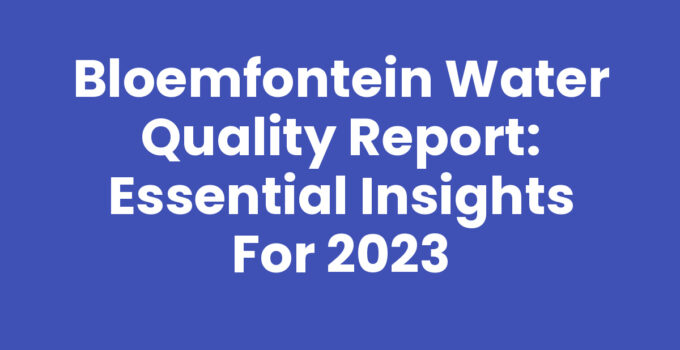The quality of water is crucial for health, sustainability, and overall wellbeing. For the residents of Bloemfontein, understanding the water quality report is essential to make informed decisions about their water consumption and health. This comprehensive guide will delve into the recent Bloemfontein water quality report, exploring what the findings mean for you and your community.
Bloemfontein Water Quality Report: A Detailed Overview
The Bloemfontein water quality report provides vital information about the safety and quality of drinking water in the area. The report is conducted annually by the local municipality and includes tests for various contaminants, such as bacteria, heavy metals, and chemical pollutants.
1. Understanding Water Quality Parameters
The water quality report usually tests for parameters that reflect the safety and purification level of drinking water. Here are some critical parameters:
- Bacteria Levels: Tests for E.coli and total coliform bacteria indicate water contamination from fecal sources, which is essential to assess public health risks.
- pH Level: The pH level of water can influence the solubility and availability of minerals and heavy metals, which is essential for both drinking and irrigation purposes.
- Heavy Metals: Reports usually check for lead, mercury, and arsenic levels which can be harmful, especially to vulnerable populations.
- Nutrients: Nitrates and phosphates can come from fertilizers and can lead to excessive plant growth in the water, resulting in algal blooms.
Understanding these parameters helps residents make informed decisions about using tap water for drinking and cooking.
2. What the Latest Report Indicates
The latest Bloemfontein water quality report reveals that, in general, water quality is within acceptable limits for most parameters. However, there are concerning indicators that residents should be aware of:
- Increased E.coli Levels: Some areas have reported spikes in E.coli, mainly due to outdated sewer systems and infrastructure flaws, necessitating public caution.
- Heavy Metal Concentrations: Although generally within limits, the levels of certain heavy metals in specific neighborhoods raised concerns necessitating additional testing.
Residents should stay updated with the municipality’s announcements, especially during and after rainfall when contaminants can enter water supplies more easily.
3. Health Implications
Understanding the implications of the water quality report on health is vital for all residents:
- Group at Risk: Children, pregnant women, and the elderly are most vulnerable to waterborne diseases and should take extra precautions.
- Water-borne Diseases: Following high E.coli levels, the risk of infections such as gastroenteritis can increase. Boiling water or using water filtration systems is advisable for these groups.
Local authorities often recommend short-term approaches, including boiling water for drinking and cooking during contamination alerts.
Recommended Guide: The History of the Free State Cheetahs, Bloemfontein Unveiled
Improving Water Quality in Bloemfontein
Residents can take several steps to advocate for and improve water quality within their community:
- Awareness Campaigns: Educate fellow residents about the significance of reporting leaks and pollution sources.
- Participation in Local Governance: Attend municipal meetings focused on water quality to voice concerns and suggest improvements.
- Home Filtration Systems: Residents should consider investing in home filtration systems that effectively remove contaminants in tap water.
Improving water quality isn’t solely the responsibility of authorities; proactive community engagement can greatly enhance the safety and quality of water for everyone.
See Also: Future Developments in Bloemfontein: What to Expect in Coming Years
Conclusion
The Bloemfontein water quality report serves as an essential tool for residents to evaluate their water safety. By understanding the report’s findings, being aware of health implications, and working collectively to advocate for better infrastructure, Bloemfontein residents can ensure a safer and healthier future regarding their water supply.
Recommended Reading: Trusted LG Microwave Repair Specialist in Bloemfontein
Frequently Asked Questions
What is included in the Bloemfontein water quality report?
The report includes tests for bacteria, heavy metals, pH levels, and nutrients, providing insights into the safety of drinking water.
How can I improve water quality in my home?
Investing in home filtration systems and boiling water when advised can significantly improve the water quality for drinking and cooking.
Who should be most concerned about water quality?
Children, pregnant women, and the elderly should be especially cautious due to their increased vulnerability to waterborne illnesses.



